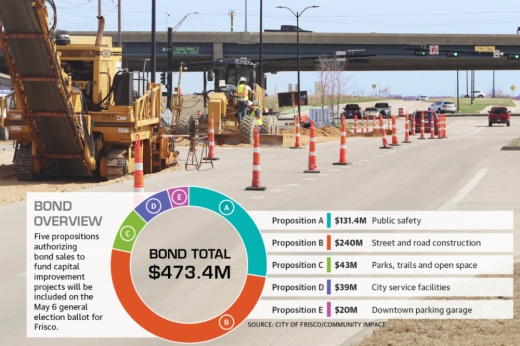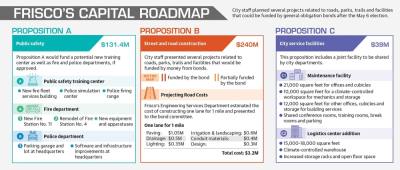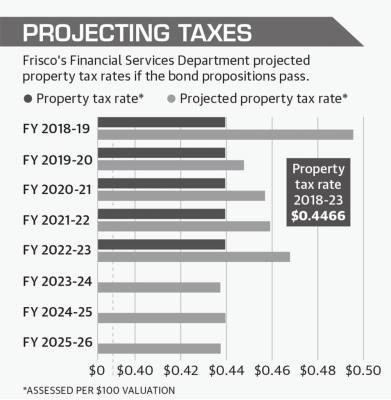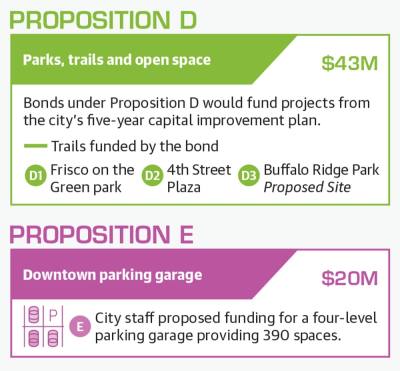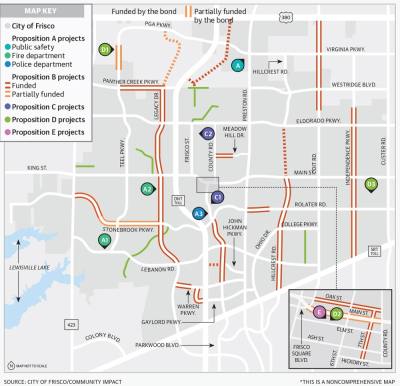The bond election called by Frisco City Council in February will consist of five propositions totaling $473.4 million. If approved by voters, the propositions will authorize the sale of bonds to fund capital projects related to public safety, roads and streets, parks and trails, a downtown parking garage, and more.
During council’s Feb. 7 meeting, Mayor Jeff Cheney said city staff are now planning facilities for a full build-out population, which is estimated to be about 325,000 people, according to the city website. There is an estimated 16% of undeveloped land left in Frisco before it reaches build out.
The U.S. Census Bureau estimated Frisco’s population to be about 211,000 people in July 2021.
“Just like we did with the library, which ... was planned and designed for full build-out—[as was] the courthouse [and] other recent buildings—these buildings are kind of taking all of our city service buildings essentially to full build-out,” Cheney said.
Proposed bond projects include a downtown parking garage that will be part of the city’s Rail District redevelopment plans. The Frisco Fire Department proposed a new station in the southwest quadrant of the city that would lower response times to calls in the area. More funding is also needed for road construction in Frisco’s northern corridor, including Fields Parkway and Frisco Street.
Frisco last held a bond election in 2019 that provided funding for the city’s new public library, which opened in March. Voters approved every bond proposition on the ballot in 2015 and 2019.
Approaching build-out
All of the city’s departments have long-term master plans to gauge when they need bond money for projects, Frisco Chief Financial Officer Anita Cothran said.
“We base those proposition requests on departments’ long-range planning,” Cothran said.
Once city officials determine which projects need funding and when, they are presented to the bond committee to consider before it goes to council. Not all requested propositions make it to the ballot.
The only proposition recommended by the Citizen Bond Committee to not make it onto the May 6 ballot was a proposed $5 million for the construction of an animal shelter in Frisco. The recommendation was not supported by city staff.
Among the called propositions, Proposition A would authorize $131.4 million in bonds for both the fire and police departments. If approved by voters, the bonds would fund a new fire station, equipment, vehicles, a remodel of Fire Station No. 4 and a new fire fleet services building.
Bonds from this proposition would also fund a new parking garage at the police department headquarters and the second phase of a public safety training center for both departments.
Proposition B would authorize $240 million in bonds for street and road construction and improvements.
Proposition C would allocate $39 million for a joint parks operation facility/building services maintenance building and an additional logistics center building.
Parks and Recreation Director Shannon Coates said the new facility would give the department more space for equipment and more employees. The parks and recreation department has about 74 staff members. At build-out, the department is expecting to employ between 140-150 people.
If approved, Proposition D would fund about $43 million for parks, trails and open-space projects. The plan is heavily focused on connectivity via hike and bike trails, according to a department presentation to the bond committee Nov. 7.
Streets and roads
The $240 million proposition for street and road construction and improvements is about $85 million more than what voters approved in 2019. The city still has $25 million in bonds from previous elections, according to an Oct. 24 presentation.
“Part of this is more than we typically would put for roads on a bond,” Cheney said during a Feb. 7 council meeting. “A big part of that is cost escalation.”
Engineering Services Director Paul Knippel said the increase in bond money requested for roads has more to do with the cost of construction than an increase in road projects. The cost of constructing one lane for 1 mile saw about a 25% increase since 2021, he said.
“We work closely with development services, which is another city department, [and] the planning group here with the city, to understand what the needs are now and what they’re going to be,” Knippel said.
The plan is translated into a color-coded spreadsheet representing the stage of each project and the funding it has received, he said.
“The further you get out on the five-year plan, roadways are often in the planning stage,” Knippel said. “We are anticipating that they’re going to be needed, [and] we know about how much they’re going to cost.”
The city’s transportation division measures traffic, and the data assists in determining project priority.
For example, a four-lane road typically sees 20,000-30,000 cars every day, Knippel said. If daily use goes over that, it is a sign to increase the road.
“[A road’s] ability to process traffic begins to diminish after it begins to see so many vehicles per day on the roadway,” Knippel said. “That’s usually an indication that we need to add capacity to the roadway.”
The tax rate
If the propositions are approved by voters, the city is then authorized to begin selling bonds to pay for them.
“The city decides once a year with the city management, city council and the department heads that are over projects,” Cothran said. “We decide, ‘OK, we’re going to do Fire Station [No.] 11 this year, so we need to sell that bond money.’”
Cities pay back debts on bond sales by collecting property taxes. When Frisco residents pay property taxes, which are set at $0.4466 per $100 valuation, the money is split into small portions allocated for different city spending costs.
“A portion of that tax rate goes to general operations, like paying people’s salaries, buying vehicles, maintaining buildings,” Cothran said. “The other portion, $0.15 of our $0.4466, goes to our debt service.”
The operations rate is typically $0.30. The property tax rate has been set at $0.4466 for over five years and is not expected to change, Cothran said.
The consistent population growth in Frisco helps keep the tax rate steady, Cothran said. More people moving into the area and paying city taxes helps chip away at the debt without needing to raise property taxes.
The city’s financial services department projects 7% increases in taxable value each year until 2029.
“As we pay off debt that we sold over the last 20 years, we have less debt to pay for,” Cothran said. “But we sell new debt for new projects, and it kind of fills it in so that we still pay about the same amount every year.





